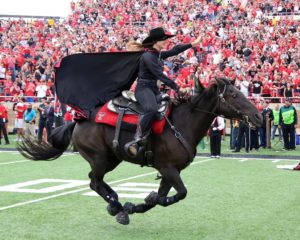 I grew up on football. As a Texan at heart and Texas Tech alumna, I closely follow the exploits of Kliff Kingsbury and his players. I’m also a big fan of Tech’s former coach, Mike Leach, who is widely known for his ridiculous quotes and “pirate” philosophy – wherein his concept of teamwork is cajoling a group of misfits to band together for shared success, just as pirates did in days of old.
I grew up on football. As a Texan at heart and Texas Tech alumna, I closely follow the exploits of Kliff Kingsbury and his players. I’m also a big fan of Tech’s former coach, Mike Leach, who is widely known for his ridiculous quotes and “pirate” philosophy – wherein his concept of teamwork is cajoling a group of misfits to band together for shared success, just as pirates did in days of old.
In addition to teamwork, these storied and successful coaches focus on fundamentals. As on the gridiron, a playbook of fundamentals can provide success in PR, too. So, as this year’s football season kicks into high gear, it might be useful for PR people – pirates or not – to review a few basic moves that will serve them well with clients.
First, add value. While it seems obvious, practitioners need to remember that PR programs should be designed and implemented in a way that supports marketing objectives that are driven by corporate objectives. The purpose of PR isn’t merely to generate coverage; it is about business results for our clients. Account teams should think about business results regularly and often and come to client interactions well-prepared with industry and trends knowledge and suggestions based on that knowledge. This is particularly true when meeting with heads of marketing and other executives who may not be your daily contacts. They will notice when their PR firm stays on top of competitive trends and information.
Second, PR professionals should think of themselves as a player/coach or perhaps a player/athletic director or general manager, broadly responsible for the success of a program but also making significant contributions to execution. PR pros should cultivate a player/coach mentality that combines tactical and operational support with ongoing strategic guidance and counsel.
Finally, another key to success is communication. Clients should always be fully informed about project status and plans, because they themselves are constantly being asked about status and plans by their own leadership. So, practitioners should do as much as possible to be prepared for and help them handle such questions. This is often as simple as being diligent about follow-up on requests for comment and information or confirming that your client has what they need, when they need it. Agencies should also offer polite, helpful reminders about projects in motion, as our contacts are frequently juggling multiple projects and programs. Being proactive shows that the agency has its head in the game.
Just like football players try to avoid penalties, agency PR pros should avoid the typical client “pet peeves.” These include:
- Agency bait and switch. Quite often, senior agency personnel show up at the beginning of an account relationship and then disappear. Agencies should instead staff accounts properly, with a mix of senior and less-experienced team members, in order to avoid the bait-and-switch that many agencies are guilty of.
- Exaggerated evidence of success. Don’t describe coverage in unrealistic and/or excessively profuse terms. Additionally, don’t characterize modest coverage or brief story mentions as “great coverage.” Clients know the difference.
- Not accepting responsibility. Most importantly, PR agencies should admit to our mistakes. Everyone drops the ball occasionally, so take ownership without making excuses and gracefully move on and re-focus efforts on the rest of the “game.”
- Making the client’s life harder. Finally, don’t make your client’s life harder by failing to manage internal agency personnel issues. Agency team turnover is a fact of life, but when it happens, make sure that a smooth transition plan is in place prior to informing the client. This keeps clients assured that service will continue to flow smoothly.
In our profession as in football, focusing on some basic, fundamental skills – the “blocking and tackling” of PR, if you will – can help ensure that clients are getting the results and support needed to help maximize success. That’s a playbook that both agencies and clients can believe in!



